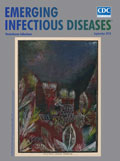
Volume 24, Number 9—September 2018
Research Letter
Travelers’ Actual and Subjective Knowledge about Risk for Ebola Virus Disease
On This Page
Abstract
To determine travelers’ actual and subjective knowledge about risk for Ebola virus disease, we surveyed travelers from France. Actual knowledge did not prevent irrational perceptions or promote safe behavior. Rather, readiness to adopt protective behavior depended on subjective knowledge and overconfidence in ability to self-protect.
The 2014–2016 epidemic of Ebola virus disease (EVD) in West Africa was the largest ever recorded. As for many other infectious diseases (1,2), surveys of knowledge, attitudes, and practices report suboptimal knowledge and misperceptions of risk for EVD among various populations (3–6). Recommendations typically emphasize the need to increase actual knowledge (what persons really know) to reduce irrational beliefs and risky behavior. However, subjective knowledge (what persons think they know), which has been overlooked in EVD surveys, can lead to the erroneous feeling that one has the requisite knowledge to avoid adverse events, resulting in a higher risk of experiencing negative outcomes (7). To determine if actual and subjective knowledge about EVD would lead to differing perceptions of risk, we surveyed travelers from France who had visited the International Vaccination Center at North Hospital in Marseille, France, for pretravel consultation during May 2015–February 2016.
A sample of 189 participants (93 women, 96 men; mean age ± SD 37.78 ± 14.50 years) anonymously completed a questionnaire about their knowledge and perceptions of risk of acquiring EVD. Respondents reported their sociodemographic characteristics, destination, purpose of travel, date of departure, and date of return. Questions about EVD actual knowledge included preventive measures, transmission routes, epidemic status, affected countries, and presence of EVD in the destination country. We used correct responses to compute final scores (Technical Appendix). We used 5-point Likert scales (1 = strongly disagree to 5 = strongly agree) to record travelers’ self-reports pertaining to their subjective knowledge (7) and several risk perceptions about EVD (6,8,9): perceived seriousness of EVD, awareness of EVD risk in the destination country, perceived effectiveness of protective measures, fear of contracting EVD in the country of destination, fear of contracting EVD in Europe, and intentions to adopt preventive behavior. Personal control and unrealistic optimism were assessed as key measures of positive illusions that typically lead persons to overestimate their capabilities to protect themselves against adverse events (8,9) (Technical Appendix).
Among the 189 participants, 25.9% planned to travel to West Africa (2.6% to an affected country, Guinea), 21.7% to other African countries, and 52.4% to other countries worldwide. Only 10.6% were able to correctly report the 3 countries affected by the EVD epidemic (Liberia, Sierra Leone, Guinea), and many were unaware of preventive measures (45%) and modes of Ebola virus transmission (39.1%). The most frequent answers for preventive measures were practice careful hygiene (24.34%), avoid contact with infected persons (23.28%), and wear protective equipment (21.16%). Answers about modes of Ebola virus transmission were body contact (31.22%), body fluids (30.16%), and aerosol (12.17%; this answer is wrong). Overall, the actual knowledge about EVD was very low (mean 3.57 correct responses; maximum possible score = 16). Simultaneously, subjective knowledge was low (mean ± SD 2.39 ± 1.00; maximum possible score = 5.00) (Technical Appendix Table 3 for bivariate intercorrelations).
To go beyond bivariate correlations and to estimate the associations between risk perceptions and each type of knowledge, we used multiple regression analyses (Table). Findings showed that actual knowledge was far from being as effective, as typically thought from knowledge, attitudes, and practices studies (3–5). Actual knowledge was associated only with higher perceived seriousness of the disease and lower awareness of risk for EVD in the country of destination, which reflects some rational perceptions (EVD is indeed serious, and most destination countries for this sample population were not affected by the epidemic). However, travelers with greater actual knowledge were not more likely to view protective measures as efficient, to avoid positive illusions, or to intend to engage in protective behavior. On the contrary, travelers with higher subjective knowledge reported confidence in preventive measures and intention to adopt safe behavior, while indicating illusions of having personal control and unrealistic optimism. Results of a further analysis (Technical Appendix) revealed that positive illusions and subjective knowledge were positively associated with behavioral intentions.
Our observations of suboptimal actual knowledge about EVD replicated findings of past knowledge, attitudes, and practices studies (3–6); however, we went further by showing that relationships between actual versus subjective knowledge and perceptions of risk for EVD differed. The fact that subjective knowledge and positive illusions, but not actual knowledge, were associated with protective behavior intentions is problematic, especially because actual knowledge was low. Persons’ belief that they know how to protect themselves when they actually do not and the feeling of knowing added to a feeling of overconfidence in how to self-protect might result in risky rather than safe behavior (7).
Our results indicate that not considering subjective knowledge and positive illusions can lead to the erroneous conclusion that increasing actual knowledge will necessarily translate into behavioral change and good practices. EVD communication would benefit from research showing that promoting behavioral change requires changing subjective evaluations of risk to make it self-relevant and to induce a reappraisal of the perceived benefits of (or costs of not) performing safe behavior (10).
Dr. Régner is assistant professor at the Cognitive Psychology Laboratory and head of the Centre of Social Sciences at the Faculty of Sciences, Aix-Marseille Université, France. Her research interests include social cognition and risk perceptions.
Acknowledgment
The Mediterranée Infection Institute is funded by the Agence Nationale de la Recherche “Investissements d’Avenir” (Méditerranée Infection 10-IAHU-03).
References
- Dijkstra A, Rothman A. Social psychology of health and illness. In: Steg L, Keizer K, Buunk AP, Rothengatter T, editors. Applied Social Psychology. Cambridge (UK): Cambridge University Press; 2017. p. 214–34.
Table
Cite This ArticleOriginal Publication Date: 7/23/2018


































No hay comentarios:
Publicar un comentario